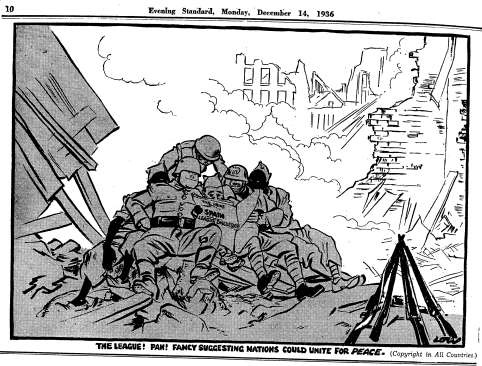Some ideas:
Source A
Recent events have shown that the British people's hope
that [the League of Nations] would be adequate for the maintenance of peace is
premature...
In existing conditions, [a government White Paper suggests that] an additional expenditure on the armaments of the Defence Services can no longer be postponed
The Times newspaper (5 March 1935) reports a decision by the British government that growing
German, Russian and Japanese aggression required a new policy to defend
Britain.
Source B
In June 1935, Britain made a naval agreement with Hitler, to let Germany have a navy one-third of the size of Britain's. It was the sign that Britain had given up on the League as a way to keep the peace, and was trying a new policy - appeasement.
A modern historian suggests that Britain's naval agreement with Germany was
a decision by the British government to abandon 'collective security'
(2004).
Source C
The Covenant of the League has been violated... We shall therefore have to climb down, and Hitler has scored. We must swallow this humiliation as best we may, and be prepare to become the laughing stock of Europe. I do not mind that very much. We can rebuild our shattered name. But it does mean the final end of the League and that I do mind dreadfully. Quite dreadfully.
A letter written by the British diplomat Harold Nicolson to a friend,
after Hitler had marched into the Rhineland (12 March 1936).
Source D
 
This cartoon by the British cartoonist David Low, drawn during the Spanish Civil War, appeared
in the Evening Standard newspaper, 14 December 1936.
The headline on the newspaper reads: 'SPAIN - League
Discussion'.
The soldiers are saying: 'The League! Pah! Fancy suggesting nations could
unite for peace'.
Click here for the interpretation
Source E
The events of the 1930s doomed the League of Nations. By 1936, after the Disarmament Conference had failed, few people looked to Geneva for the answers to Europe's problems. As civil war erupted that summer, Spain was added to Manchuria, Abyssinia and the Rhineland in the roll-call of the League's failures. Hardly surprising, then, that the Spanish foreign minister should accuse the League of following 'a strange theory which said that the best way to help the League was to stop making any attempt to keep the peace or defend the Covenant'.
The historian Mark Mazower sums up the effect that these failures
had upon the League's reputation (1998).
|